The trauma of last lockdown still fresh, migrant workers make a beeline for home
As state after state announces fresh COVID-19 restrictions, migrant workers, with the horrors of the 2020 lockdown still fresh, have started to return home. They have loans to repay and financial commitments to fulfil. But, with rumours of a new lockdown, they don’t want to take any chances.

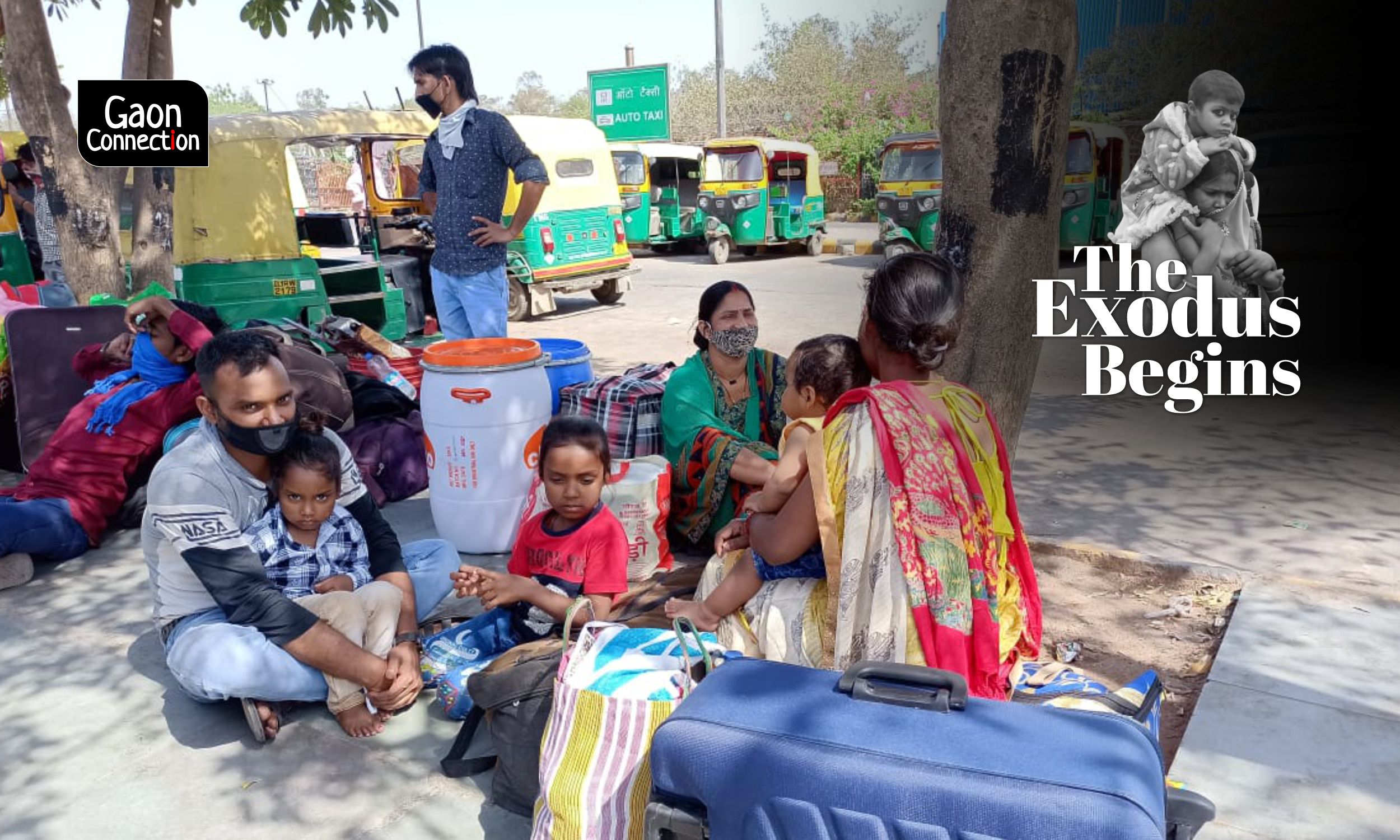
Upendra Kumar (26), wife Savita (25) and their three daughters at Anand Vihar railway station in Delhi on April 9 waiting to return to their village in Ballia, Uttar Pradesh. Pic: Somya Lakhani/GC
New Delhi
Just when 35-year-old Mani Ram thought it was all over and he could start life afresh, the nightmare is back. A native of Uttar Pradesh’s Sant Kabir Nagar who works at a factory in Delhi’s Mayapuri Industrial area, Ram is haunted by memories of being stuck in the city without food, water and money.
Ram still remembers the futile attempts to walk back home with his wife and two young children amid the nationwide lockdown a year ago, and being made to turn back by the police, at the national capital’s borders. He used to stand in the queue for hours in the peak summer heat to collect food for his kids from a school nearby. He lost his job as the factory shut down, and had to borrow money to survive in the pandemic.
“Darr hai ki iss baar bhi wahi haal hoga, bahut dukh jhela hai humne [I fear the same scenario will repeat, we have already suffered a lot],” Ram told Gaon Connection. He accumulated a debt of Rs 15,000, which he has just managed to pay off. “If there’s a lockdown again, I will have to borrow money to survive, and then spend all of next year paying it off. I can’t keep doing this, and so I am planning to go back home,” he said.
Over 1,400 kilometres from Ram’s industrial unit in Delhi, Sujit Kumar, in his early 20s, boarded the packed train 023212 from Mumbai on April 8. He was on his way home to Ranchi in Jharkhand when Gaon Connection met him at Satna railway station in Madhya Pradesh.
Also Read: COVID19: Is Maharashtra heading for a lockdown?
“Our seth gives us a room to stay in only if we work. Since work is less, seth told us to go back home for some time. It was not possible to get a confirmed ticket, and so we just booked a chalu [unreserved] ticket and are returning home,” Sujit, who worked at a dairy in Panvel, about 35 kilometres from Mumbai, told Gaon Connection.
Since he did not have a confirmed ticket, Sujit was travelling in the train’s toilet, face covered with a black mask, to reach his home over 2,000 kilometres away.
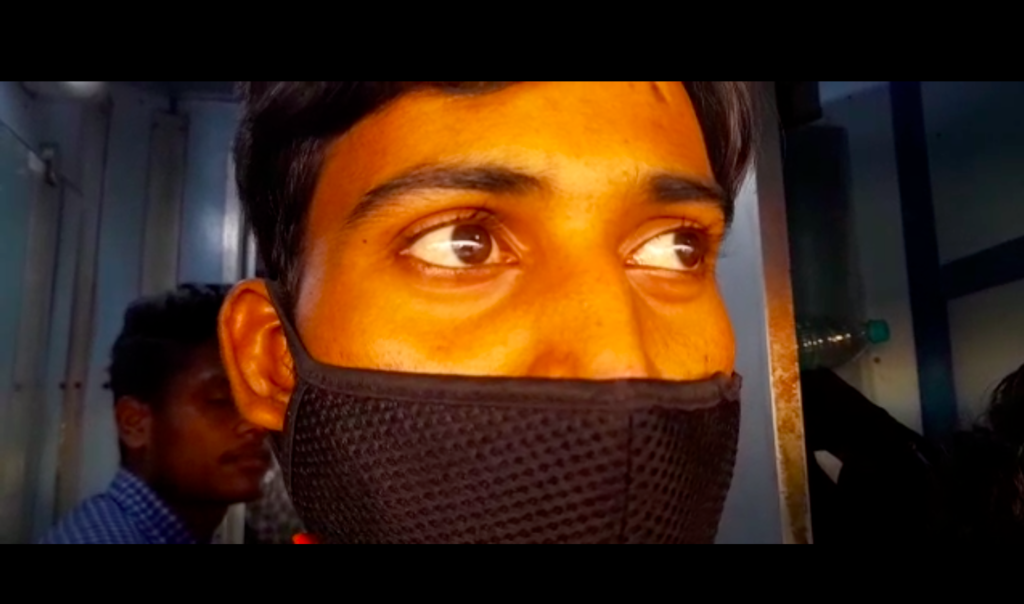
Meanwhile, in Mirzapur village of Gorakhpur, Uttar Pradesh, a group of young men has just returned from Hyderabad as news of a fresh nationwide lockdown is doing the rounds on WhatsApp.
Also read: Amid rising COVID19 cases, migrant workers in rural UP anxious about another lockdown
In the last 24 hours, India reported 145,384 new coronavirus cases, another single-day highest surge since the COVID-19 pandemic began. The active cases in the country have crossed the million mark. In the wake of the second wave of the virus, a number of states and UTs such as Delhi, Maharashtra, Karnataka and Odisha have announced COVID-19 restrictions.
Today, April 10, Delhi Chief Minister Arvind Kejriwal said there would not be another lockdown in the national capital, but said fresh restrictions were on the anvil. Schools for all classes in Delhi have been closed until further notice, he tweeted.
Maharashtra, which is the worst-affected state, may be headed for a complete lockdown, as indicated by its health minister Rajesh Tope on April 9. A number of states have also reported vaccine shortage.
Also Read: COVID19: Which states in India are reporting ‘vaccine shortage’? Details here
Predictably, millions of migrant workers across the country are anxious. Last year, amid the lockdown, more than 10 million (10,466,152 to be exact) workers returned to their hometowns, as informed by Santosh Kumar Gangwar, Minister of State for Labour and Employment, in a written reply to parliament last September.
However, the Railways has denied that there was a rush among migrant workers to travel back home in light of the fresh spike in coronavirus cases and said there is no plan to curtail or stop train services.
“There is no plan to curtail or stop train services. We will run as many services as required. There is no cause for alarm. We can run trains immediately on demand if there is any rush. This rush is normal during the summer season and we have already announced trains to clear the rush,” Railway Board chairperson Suneet Sharma was quoted as saying.
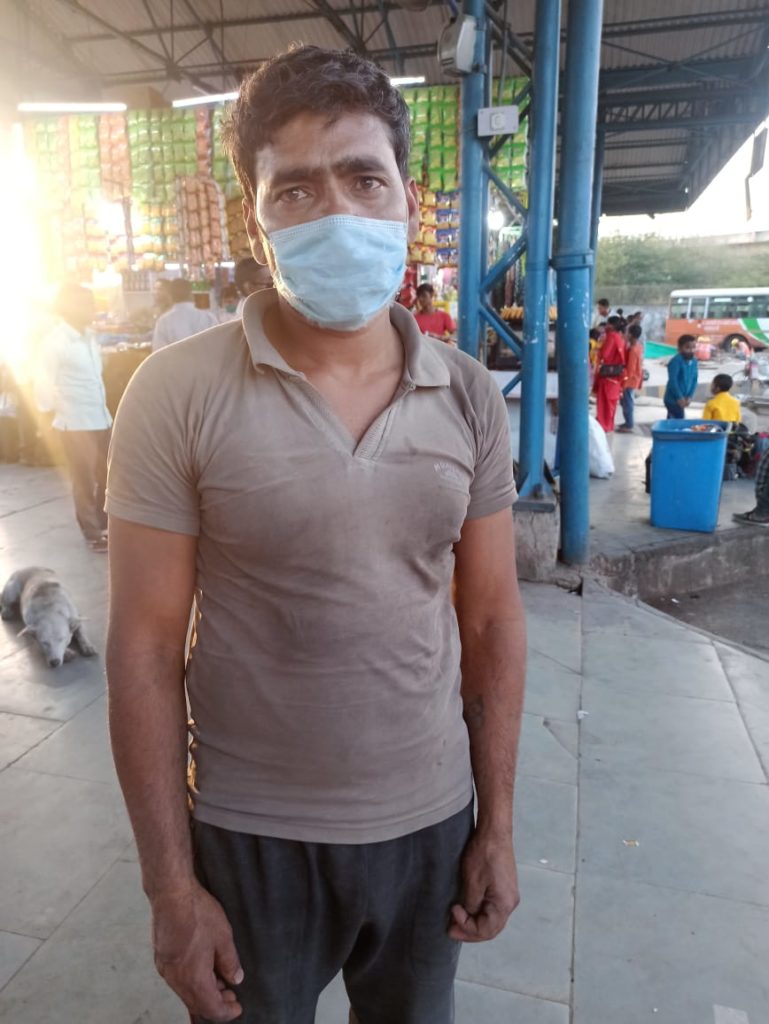
Pic: Somya Lakhani/GC
Last summer, in a first-of-its-kind national survey to document the impact of the COVID-19 lockdown on rural India, Gaon Connection interviewed 25,371 rural residents, including migrant workers, across 23 states last summer.
Also Read: 80% rural respondents said their work was affected due to the lockdown
The survey showed that 23 per cent of migrant workers returned home walking during the lockdown, 18 per cent by bus, and 12 per cent by train. While on their way home, 12 per cent of migrant workers were reportedly beaten by the police. About 40 per cent of this workforce faced food scarcity during its journey back home (read full survey report here).
Also Read: Almost every fourth migrant worker returned home on foot during the lockdown
The rising COVID19 cases and fear of another lockdown is making a section of migrant workers head back home. They do not want to undergo the misery they underwent last year when the sudden lockdown announcement left them high and dry in cities with no food, water or money.
As soon as night curfew was imposed in Delhi on April 6, 35-year-old factory worker Prashant Tiwari recalled the nightmare of 2020 — serpentine queues for a bowl of khichdi, the nervous wait for a train seat, and gutting visuals of many like him walking back hundreds of kilometres to villages from the cities they helped build.

“What if the next step after a night curfew is a full lockdown? What if I go hungry again? I’m scared. I don’t trust the government. So, I decided to pack and leave. I reached home today [April 9],” said Tiwari, over phone from Uttar Pradesh’s Ambedkar Nagar, approximately 750 kilometres from Delhi.
Also Read: Preyed on by the pandemic
On April 9, at east Delhi’s Anand Vihar railway station, 26-year-old Upendra Kumar, his wife Savita and their three daughters, including a toddler, waited. Upendra, who works with a marble flooring contractor in Delhi’s Badarpur for Rs 13,000 a month, hails from Bairiya in Uttar Pradesh’s Ballia district. He has been working in the national capital for eight years now.
“Last year, when the lockdown was announced I was in my village for some work, so I didn’t undergo the hardship that my friends and relatives did. I watched on TV how so many walked back, some died, many starved, died on railway tracks or highways… When I found out about the night curfew this week, my wife and I got afraid,” said Upendra.
As she cradled the eight-month-old baby, Savita said her in-laws spent over Rs 15,000 to bring back four relatives stuck in Pune during the lockdown last year. “We can’t afford it again. My daughters are less than five years old, I can’t expect them to walk back or go hungry like children did last year. So, we are going back home,” she said.
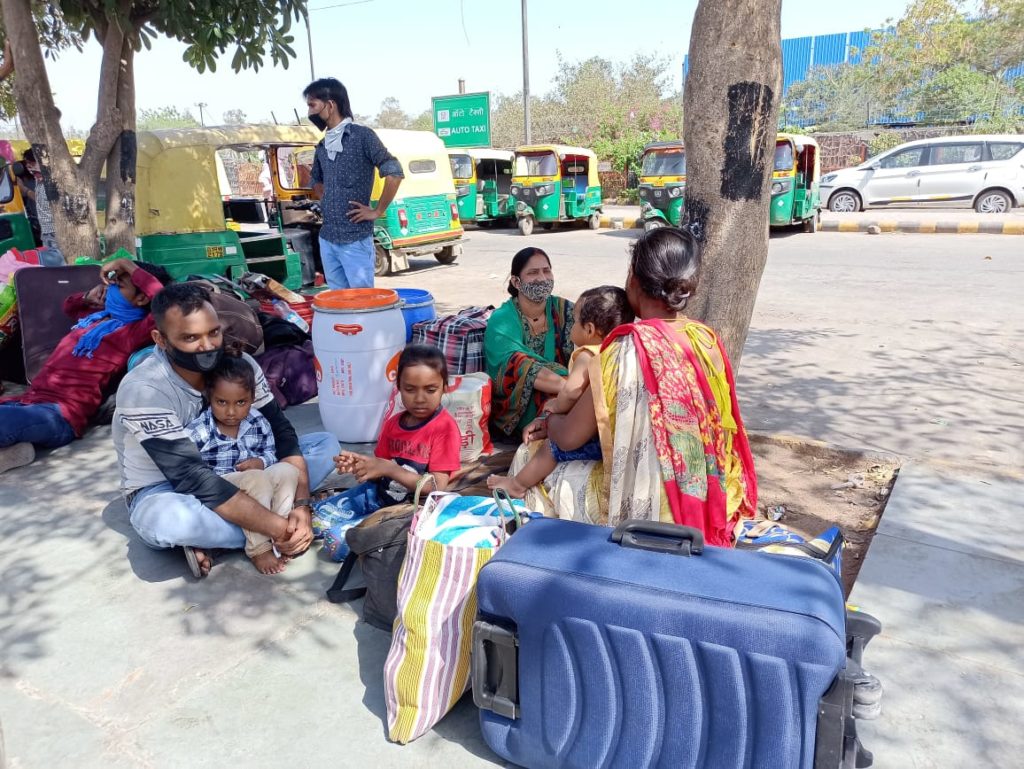
Pic: Somya Lakhani/GC
Also Read: Migrant Workers: The Indian government does not know their numbers, dead or alive
A few metres away, at the Anand Vihar ISBT (Inter-state bus terminal), 28-year-old Bhaskar Pandey lugged a suitcase towards a bus, en route to Almora in Uttarakhand. Employed as a cook at a five-star hotel in New Delhi, Pandey took two weeks’ leave when he read about the night curfew in the city.
“I have good reason to be afraid. Last year, when the lockdown was implemented, I was in Pune, and it took me forty days to get back home. I spent fifteen thousand rupees on the journey, and was made to quarantine twice for fourteen days each — once in UP [Uttar Pradesh] and then in Uttarakhand. It was harrowing,” said Pandey.
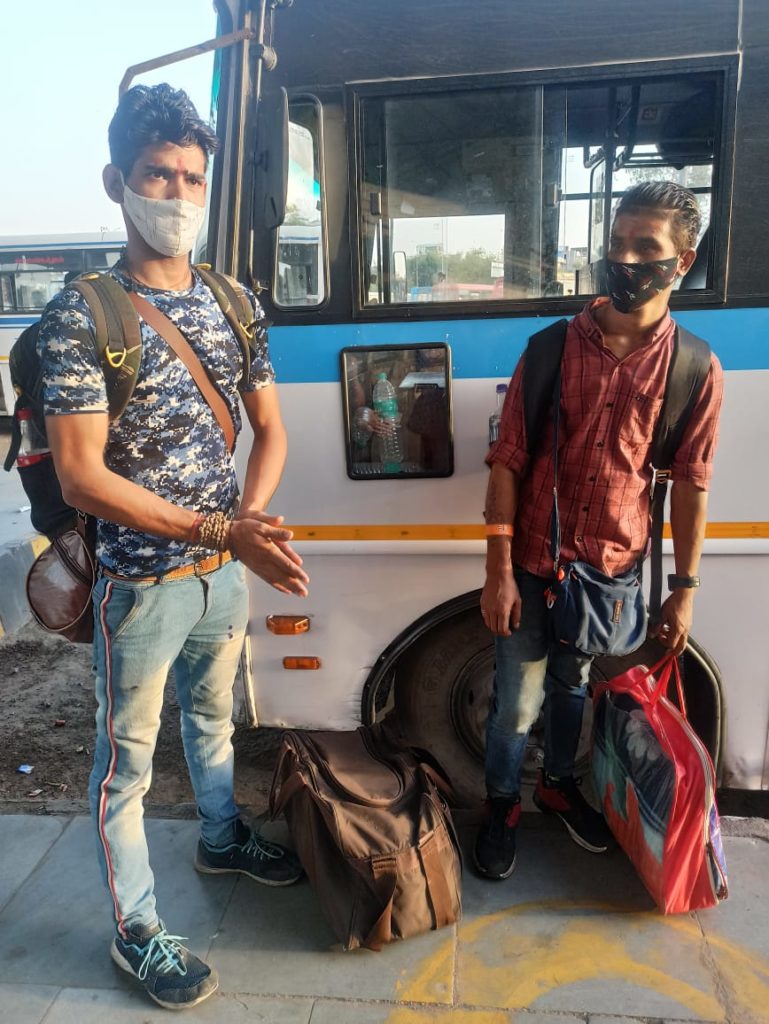
At the railway station nearby, 50-year-old Shatrughan Prasad of Bihar’s Chhapra enquired about trains leaving from Delhi this weekend for his village, where his wife and their five children live. He works at a factory manufacturing plastic boxes in Noida and earns Rs 10,000 a month.
“Logon mein halla hai ki lockdown hone waala hai, gharwaale keh rahe hai vaapis aa jao. Peechle saal mazdooro ka bura haal hua tha, humne TV par dekha tha [There is a rumour that lockdown will be announced soon. My family wants me to return home. Last year, we all watched on TV how migrant workers suffered],” Prasad told Gaon Connection.
Rising debt
Migrant workers fear another lockdown may mean additional debt, at a time when many are yet to repay what they borrowed during last year’s lockdown.
“I was a factory supervisor and earned fourteen thousand five hundred rupees a month. It shut down during lockdown. I was stuck with my wife and two toddlers, and we finally left for home on May 15,” Tiwari, who again left this year, and reached his home in Uttar Pradesh’s Ambedkar Nagar, narrated to Gaon Connection.
“From March to May last year, I took a loan of twenty five thousand rupees from friends and family. In July, I came back to Delhi because I had to earn money to pay that back, but jobs were scarce. I began working at another factory for a lesser salary of eight thousand five hundred a month. Abhi tak peechhla karza nahi chukaya hai, aur kaise le le apne sarr pe? [I haven’t even repaid last year’s debt. How do I borrow more money?],” he asked.
Also Read: One in five rural households sold or mortgaged land, jewellery or valuables during the lockdown
A similar sentiment was echoed by 40-year-old Durga Prasad, who lost his job at a cable wire factory in Okhla Industrial Area during the 2020 lockdown. A native of Azamgarh in Uttar Pradesh, Durga now makes Rs 500 a day loading and unloading goods at a factory in Delhi.
“My salary paid the room rent, childrens’ tuition fees and daily expenditure. When I lost my job, I borrowed approximately twenty thousand rupees from relatives who were in the village. I am yet to repay the full amount, and if I stay back in Delhi now, and there’s another lockdown, no one will lend me money. My family wants me back home in the next few days,” he told Gaon Connection.
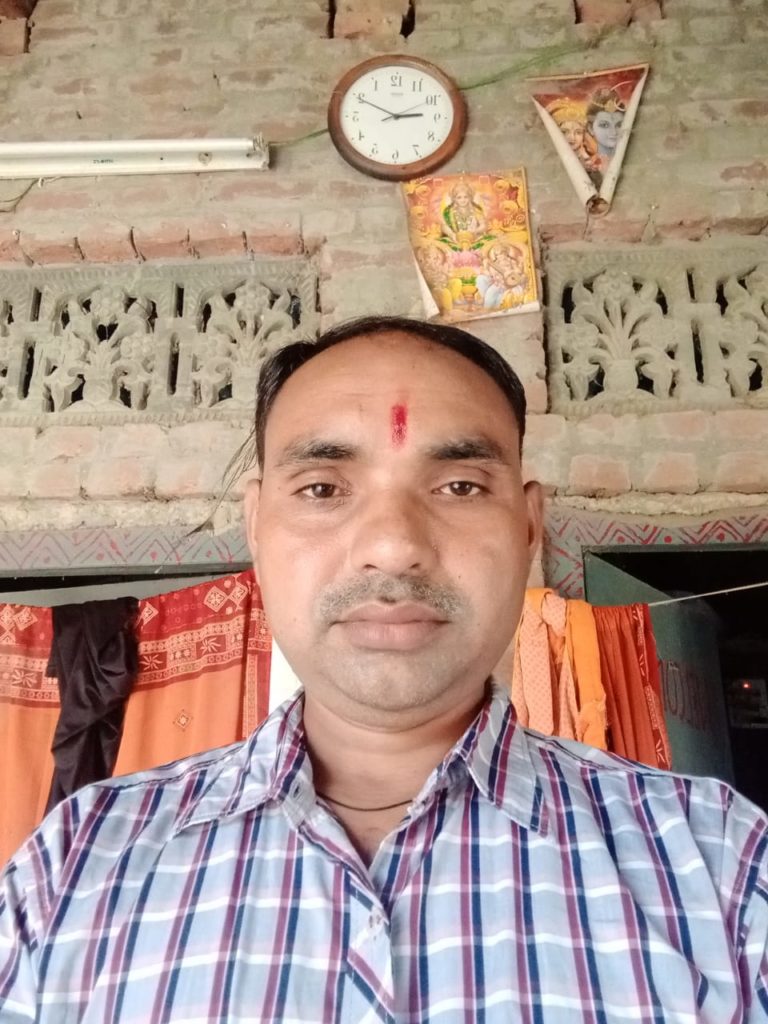
Meanwhile, 35-year-old Ramdeen, who works at construction sites in Delhi and hails from Azamgarh, said he would drop off his wife and their four children in their native place this weekend. “If there is a lockdown in Delhi, I will manage alone somehow. Last year, we were all together and suffered a great deal because after a while my employer couldn’t help out financially. No one wants a repeat of last year’s tragedies,” he said.
And so, they wait, in bus and railway stations, fear of another lockdown looming large, and a general sense of dread about a future rendered even more uncertain by the second wave. They finally seek the one place that offers succour, even amid poverty — home.
With inputs from Sachin Tulsa Tripathi, Satna, Madhya Pradesh.
Also Read: Pehlwan: Migrant workers who are also migrant warriors of Mumbai

